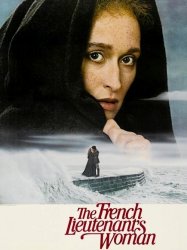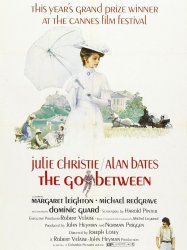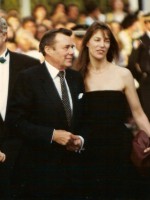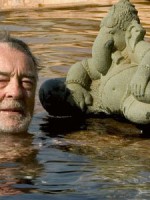Harold Pinter is a Actor, Director and Scriptwriter British born on 10 october 1930 at London (United-kingdom)
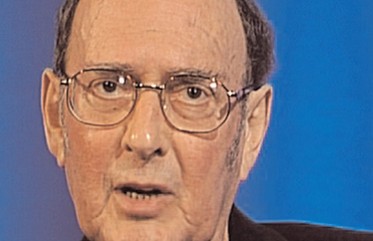
Harold Pinter, (/ˈpɪntər/; 10 October 1930 – 24 December 2008) was a Nobel Prize-winning English playwright, screenwriter, director and actor. One of the most influential modern British dramatists, his writing career spanned more than 50 years. His best-known plays include The Birthday Party (1957), The Homecoming (1964), and Betrayal (1978), each of which he adapted for the screen. His screenplay adaptations of others' works include The Servant (1963), The Go-Between (1971), The French Lieutenant's Woman (1981), The Trial (1993), and Sleuth (2007). He also directed or acted in radio, stage, television, and film productions of his own and others' works.
Pinter was born and raised in Hackney, east London, and educated at Hackney Downs School. He was a sprinter and a keen cricket player, acting in school plays and writing poetry. He attended the Royal Academy of Dramatic Art but did not complete the course. He was fined for refusing National Service as a conscientious objector. Subsequently, he continued training at the Central School of Speech and Drama and worked in repertory theatre in Ireland and England. In 1956 he married actress Vivien Merchant and had a son, Daniel born in 1958. He left Merchant in 1975 and married author Lady Antonia Fraser in 1980.
Pinter's career as a playwright began with a production of The Room in 1957. His second play, The Birthday Party, closed after eight performances, but was enthusiastically reviewed by critic Harold Hobson. His early works were described by critics as "comedy of menace". Later plays such as No Man's Land (1975) and Betrayal (1978) became known as "memory plays". He appeared as an actor in productions of his own work on radio and film. He also undertook a number of roles in works by other writers. He directed nearly 50 productions for stage, theatre and screen. Pinter received over 50 awards, prizes, and other honours, including the Nobel Prize in Literature in 2005 and the French Légion d'honneur in 2007.
Despite frail health after being diagnosed with oesophageal cancer in December 2001, Pinter continued to act on stage and screen, last performing the title role of Samuel Beckett's one-act monologue Krapp's Last Tape, for the 50th anniversary season of the Royal Court Theatre, in October 2006. He died from liver cancer on 24 December 2008.
Pinter was born on 10 October 1930, in Hackney, east London, the only child of English parents of Jewish Eastern European ancestry: his father, Hyman "Jack" Pinter (1902–1997) was a ladies' tailor; his mother, Frances (née Moskowitz; 1904–1992), a housewife. Pinter believed an aunt's erroneous view that the family was Sephardic and had fled the Spanish Inquisition; thus, for his early poems, Pinter used the pseudonym Pinta and at other times used variations such as da Pinto. Later research by Lady Antonia Fraser, Pinter's second wife, revealed the legend to be apocryphal; three of Pinter's grandparents came from Poland and the fourth from Odessa, so the family was Ashkenazic.
Pinter's family home in London is described by his official biographer Michael Billington as "a solid, red-brick, three-storey villa just off the noisy, bustling, traffic-ridden thoroughfare of the Lower Clapton Road". In 1940 and 1941, after the Blitz, Pinter was evacuated from their house in London to Cornwall and Reading. Billington states that the "life-and-death intensity of daily experience" before and during the Blitz left Pinter with profound memories "of loneliness, bewilderment, separation and loss: themes that are in all his works."
Pinter discovered his social potential as a student at Hackney Downs School, a London grammar school, between 1944 and 1948. "Partly through the school and partly through the social life of Hackney Boys' Club ... he formed an almost sacerdotal belief in the power of male friendship. The friends he made in those days—most particularly Henry Woolf, Michael (Mick) Goldstein and Morris (Moishe) Wernick—have always been a vital part of the emotional texture of his life." A major influence on Pinter was his inspirational English teacher Joseph Brearley, who directed him in school plays and with whom he took long walks, talking about literature. According to Billington, under Brearley's instruction, "Pinter shone at English, wrote for the school magazine and discovered a gift for acting." In 1947 and 1948, he played Romeo and Macbeth in productions directed by Brearley.
At the age of 12, Pinter began writing poetry, and in spring 1947, his poetry was first published in the Hackney Downs School Magazine. In 1950, his poetry was first published outside of the school magazine in Poetry London, some of it under the pseudonym "Harold Pinta".
Sport and friendship
Pinter enjoyed running and broke the Hackney Downs School sprinting record.
He was a cricket enthusiast, taking his bat with him when evacuated during the Blitz. In 1971 he told Mel Gussow: "one of my main obsessions in life is the game of cricket—I play and watch and read about it all the time." He was chairman of the Gaieties Cricket Club, a supporter of Yorkshire Cricket Club, and devoted a section of his official website to the sport. One wall of his study was dominated by a portrait of himself as a young man playing cricket, which was described by Sarah Lyall, writing in The New York Times: "The painted Mr. Pinter, poised to swing his bat, has a wicked glint in his eye; testosterone all but flies off the canvas." Pinter approved of the "urban and exacting idea of cricket as a bold theatre of aggression." After his death, several of his school contemporaries recalled his achievements in sports, especially cricket and running. The BBC Radio 4 memorial tribute included an essay on Pinter and cricket.
Other interests that Pinter mentioned to interviewers are family, love and sex, drinking, writing, and reading. According to Billington, "If the notion of male loyalty, competitive rivalry and fear of betrayal forms a constant thread in Pinter's work from The Dwarfs onwards, its origins can be found in his teenage Hackney years. Pinter adores women, enjoys flirting with them, worships their resilience and strength. But, in his early work especially, they are often seen as disruptive influences on some pure and Platonic ideal of male friendship: one of the most crucial of all Pinter's lost Edens."
Early theatrical training and stage experience
Beginning in late 1948, Pinter attended the Royal Academy of Dramatic Art for two terms, but hating the school, missed most of his classes, feigned a nervous breakdown, and dropped out in 1949. In 1948 he was called up for National Service. He registered as a conscientious objector, was brought to trial twice, and was ultimately fined for refusing to serve. He had a small part in the Christmas pantomime Dick Whittington and His Cat at the Chesterfield Hippodrome in 1949 to 1950. From January to July 1951, he attended the Central School of Speech and Drama.
From 1951 to 1952, he toured Ireland with the Anew McMaster repertory company, playing over a dozen roles. In 1952 he began acting in regional English repertory productions; from 1953 to 1954, he worked for the Donald Wolfit Company, at the King's Theatre, Hammersmith, performing eight roles. From 1954 until 1959, Pinter acted under the stage name David Baron. In all, Pinter played over 20 roles under that name. To supplement his income from acting, Pinter worked as a waiter, a postman, a bouncer, and a snow-clearer, meanwhile, according to Mark Batty, "harbouring ambitions as a poet and writer." In October 1989 Pinter recalled: "I was in English rep as an actor for about 12 years. My favourite roles were undoubtedly the sinister ones. They're something to get your teeth into." During that period, he also performed occasional roles in his own and others' works for radio, TV, and film, as he continued to do throughout his career.
Marriages and family life
From 1956 until 1980, Pinter was married to Vivien Merchant, an actress whom he met on tour, perhaps best known for her performance in the 1966 film Alfie. Their son, Daniel, was born in 1958. Through the early 1970s, Merchant appeared in many of Pinter's works, including The Homecoming on stage (1965) and screen (1973), but the marriage was turbulent. For seven years, from 1962 to 1969, Pinter was engaged in a clandestine affair with BBC-TV presenter and journalist Joan Bakewell, which inspired his 1978 play Betrayal, and also throughout that period and beyond he had an affair with an American socialite, whom he nicknamed "Cleopatra". This relationship was another secret he kept from both his wife and Bakewell. Initially, Betrayal was thought to be a response to his later affair with historian Antonia Fraser, the wife of Hugh Fraser, and Pinter's "marital crack-up".
Pinter and Merchant had both met Fraser in 1969, when all three worked together on a National Gallery programme about Mary, Queen of Scots; several years later, on 8–9 January 1975, Pinter and Fraser became romantically involved. That meeting initiated their five-year extramarital love affair. After hiding the relationship from Merchant for two and a half months, on 21 March 1975, Pinter finally told her "I've met somebody". After that, "Life in Hanover Terrace gradually became impossible", and Pinter moved out of their house on 28 April 1975, five days after the première of No Man's Land.
In mid-August 1977, after Pinter and Fraser had spent two years living in borrowed and rented quarters, they moved into her former family home in Holland Park, where Pinter began writing Betrayal. He reworked it later, while on holiday at the Grand Hotel, in Eastbourne, in early January 1978. After the Frasers' divorce had become final in 1977 and the Pinters' in 1980, Pinter married Fraser on 27 November 1980. Because of a two-week delay in Merchant's signing the divorce papers, however, the reception had to precede the actual ceremony, originally scheduled to occur on his 50th birthday. Vivien Merchant died of acute alcoholism in the first week of October 1982, at the age of 53. Billington writes that Pinter "did everything possible to support" her and regretted that he ultimately became estranged from their son, Daniel, after their separation, Pinter's remarriage, and Merchant's death.
A reclusive gifted musician and writer, Daniel changed his surname from Pinter to Brand, the maiden name of his maternal grandmother, before Pinter and Fraser became romantically involved; while according to Fraser, his father couldn't understand it, she says that she could: "Pinter is such a distinctive name that he must have got tired of being asked, 'Any relation?'" Michael Billington wrote that Pinter saw Daniel's name change as "a largely pragmatic move on Daniel's part designed to keep the press ... at bay." Fraser told Billington that Daniel "was very nice to me at a time when it would have been only too easy for him to have turned on me ... simply because he had been the sole focus of his father's love and now manifestly wasn't." Still unreconciled at the time of his father's death, Daniel Brand did not attend Pinter's funeral.
Billington observes that "The break-up with Vivien and the new life with Antonia was to have a profound effect on Pinter's personality and his work," though he adds that Fraser herself did not claim to have influence over Pinter or his writing. In her own contemporaneous diary entry dated 15 January 1993, Fraser described herself more as Pinter's literary midwife. Indeed, she told Billington that "other people [such as Peggy Ashcroft, among others] had a shaping influence on [Pinter's] politics" and attributed changes in his writing and political views to a change from "an unhappy, complicated personal life ... to a happy, uncomplicated personal life", so that "a side of Harold which had always been there was somehow released. I think you can see that in his work after No Man's Land [1975], which was a very bleak play."
Pinter was content in his second marriage and enjoyed family life with his six adult stepchildren and 17 step-grandchildren. Even after battling cancer for several years, he considered himself "a very lucky man in every respect". Sarah Lyall notes in her 2007 interview with Pinter in The New York Times that his "latest work, a slim pamphlet called "Six Poems for A.," comprises poems written over 32 years, with "A" of course being Lady Antonia. The first of the poems was written in Paris, where she and Mr. Pinter traveled soon after they met. More than three decades later the two are rarely apart, and Mr. Pinter turns soft, even cozy, when he talks about his wife." In that interview Pinter "acknowledged that his plays—full of infidelity, cruelty, inhumanity, the lot—seem at odds with his domestic contentment. 'How can you write a happy play?' he said. 'Drama is about conflict and degrees of perturbation, disarray. I've never been able to write a happy play, but I've been able to enjoy a happy life.'" After his death, Fraser told The Guardian: "He was a great man, and it was a privilege to live with him for over 33 years. He will never be forgotten."
Civic activities and political activism
In 1948–49, when he was 18, Pinter opposed the politics of the Cold War, leading to his decision to become a conscientious objector and to refuse to comply with National Service in the British military. However, he told interviewers that, if he had been old enough at the time, he would have fought against the Nazis in World War II. He seemed to express ambivalence, both indifference and hostility, towards political structures and politicians in his Fall 1966 Paris Review interview conducted by Lawrence M. Bensky. Yet, he had been an early member of the Campaign for Nuclear Disarmament and also had supported the British Anti-Apartheid Movement (1959–1994), participating in British artists' refusal to permit professional productions of their work in South Africa in 1963 and in subsequent related campaigns. In "A Play and Its Politics", a 1985 interview with Nicholas Hern, Pinter described his earlier plays retrospectively from the perspective of the politics of power and the dynamics of oppression.
In his last 25 years, Pinter increasingly focused his essays, interviews and public appearances directly on political issues. He was an officer in International PEN, travelling with American playwright Arthur Miller to Turkey in 1985 on a mission co-sponsored with a Helsinki Watch committee to investigate and protest against the torture of imprisoned writers. There he met victims of political oppression and their families. Pinter's experiences in Turkey and his knowledge of the Turkish suppression of the Kurdish language inspired his 1988 play Mountain Language. He was also an active member of the Cuba Solidarity Campaign, an organisation that "campaigns in the UK against the US blockade of Cuba". In 2001 Pinter joined the International Committee to Defend Slobodan Milošević (ICDSM), which appealed for a fair trial and for the freedom of Slobodan Milošević, signing a related "Artists' Appeal for Milošević" in 2004.
Pinter strongly opposed the 1991 Gulf War, the 1999 NATO bombing campaign in Yugoslavia during the Kosovo War, the United States' 2001 War in Afghanistan, and the 2003 Invasion of Iraq. Among his provocative political statements, Pinter called Prime Minister Tony Blair a "deluded idiot" and compared the administration of President George W. Bush to Nazi Germany. He stated that the United States "was charging towards world domination while the American public and Britain's 'mass-murdering' prime minister sat back and watched." He was very active in the antiwar movement in the United Kingdom, speaking at rallies held by the Stop the War Coalition and frequently criticising American aggression, as when he asked rhetorically, in his acceptance speech for the Wilfred Owen Award for Poetry on 18 March 2007: "What would Wilfred Owen make of the invasion of Iraq? A bandit act, an act of blatant state terrorism, demonstrating absolute contempt for the conception of international law."
Harold Pinter earned a reputation for being notoriously pugnacious, enigmatic, taciturn, terse, prickly, explosive and forbidding. Pinter's blunt political statements, and the award of the Nobel Prize in Literature, elicited strong criticism and even, at times, provoked ridicule and personal attacks. The historian Geoffrey Alderman, author of the official history of Hackney Downs School, expressed his own "Jewish View" of Harold Pinter: "Whatever his merit as a writer, actor and director, on an ethical plane Harold Pinter seems to me to have been intensely flawed, and his moral compass deeply fractured." David Edgar, writing in The Guardian, defended Pinter against what he termed Pinter's "being berated by the belligerati" like Johann Hari, who felt that he did not "deserve" to win the Nobel Prize. Later Pinter continued to campaign against the Iraq War and on behalf of other political causes that he supported. As Alderman points out, for example, Pinter signed the mission statement of Jews for Justice for Palestinians in 2005 and its full-page advertisement, "What Is Israel Doing? A Call by Jews in Britain", published in The Times on 6 July 2006, and he was a patron of the Palestine Festival of Literature.
Source : Wikidata
Harold Pinter

- Infos
- Photos
- Best films
- Family
- Characters
- Awards
Nationality United-kingdom
Birth 10 october 1930 at London (United-kingdom)
Death 24 december 2008 (at 78 years) at London (United-kingdom)
Awards Chevalier de la Légion d'Honneur, Laurence Olivier Award, Nobel Prize in Literature, Commander of the Most Excellent Order of the British Empire, Austrian State Prize for European Literature
Birth 10 october 1930 at London (United-kingdom)
Death 24 december 2008 (at 78 years) at London (United-kingdom)
Awards Chevalier de la Légion d'Honneur, Laurence Olivier Award, Nobel Prize in Literature, Commander of the Most Excellent Order of the British Empire, Austrian State Prize for European Literature
Pinter was born and raised in Hackney, east London, and educated at Hackney Downs School. He was a sprinter and a keen cricket player, acting in school plays and writing poetry. He attended the Royal Academy of Dramatic Art but did not complete the course. He was fined for refusing National Service as a conscientious objector. Subsequently, he continued training at the Central School of Speech and Drama and worked in repertory theatre in Ireland and England. In 1956 he married actress Vivien Merchant and had a son, Daniel born in 1958. He left Merchant in 1975 and married author Lady Antonia Fraser in 1980.
Pinter's career as a playwright began with a production of The Room in 1957. His second play, The Birthday Party, closed after eight performances, but was enthusiastically reviewed by critic Harold Hobson. His early works were described by critics as "comedy of menace". Later plays such as No Man's Land (1975) and Betrayal (1978) became known as "memory plays". He appeared as an actor in productions of his own work on radio and film. He also undertook a number of roles in works by other writers. He directed nearly 50 productions for stage, theatre and screen. Pinter received over 50 awards, prizes, and other honours, including the Nobel Prize in Literature in 2005 and the French Légion d'honneur in 2007.
Despite frail health after being diagnosed with oesophageal cancer in December 2001, Pinter continued to act on stage and screen, last performing the title role of Samuel Beckett's one-act monologue Krapp's Last Tape, for the 50th anniversary season of the Royal Court Theatre, in October 2006. He died from liver cancer on 24 December 2008.
Biography
Early life and educationPinter was born on 10 October 1930, in Hackney, east London, the only child of English parents of Jewish Eastern European ancestry: his father, Hyman "Jack" Pinter (1902–1997) was a ladies' tailor; his mother, Frances (née Moskowitz; 1904–1992), a housewife. Pinter believed an aunt's erroneous view that the family was Sephardic and had fled the Spanish Inquisition; thus, for his early poems, Pinter used the pseudonym Pinta and at other times used variations such as da Pinto. Later research by Lady Antonia Fraser, Pinter's second wife, revealed the legend to be apocryphal; three of Pinter's grandparents came from Poland and the fourth from Odessa, so the family was Ashkenazic.
Pinter's family home in London is described by his official biographer Michael Billington as "a solid, red-brick, three-storey villa just off the noisy, bustling, traffic-ridden thoroughfare of the Lower Clapton Road". In 1940 and 1941, after the Blitz, Pinter was evacuated from their house in London to Cornwall and Reading. Billington states that the "life-and-death intensity of daily experience" before and during the Blitz left Pinter with profound memories "of loneliness, bewilderment, separation and loss: themes that are in all his works."
Pinter discovered his social potential as a student at Hackney Downs School, a London grammar school, between 1944 and 1948. "Partly through the school and partly through the social life of Hackney Boys' Club ... he formed an almost sacerdotal belief in the power of male friendship. The friends he made in those days—most particularly Henry Woolf, Michael (Mick) Goldstein and Morris (Moishe) Wernick—have always been a vital part of the emotional texture of his life." A major influence on Pinter was his inspirational English teacher Joseph Brearley, who directed him in school plays and with whom he took long walks, talking about literature. According to Billington, under Brearley's instruction, "Pinter shone at English, wrote for the school magazine and discovered a gift for acting." In 1947 and 1948, he played Romeo and Macbeth in productions directed by Brearley.
At the age of 12, Pinter began writing poetry, and in spring 1947, his poetry was first published in the Hackney Downs School Magazine. In 1950, his poetry was first published outside of the school magazine in Poetry London, some of it under the pseudonym "Harold Pinta".
Sport and friendship
Pinter enjoyed running and broke the Hackney Downs School sprinting record.
He was a cricket enthusiast, taking his bat with him when evacuated during the Blitz. In 1971 he told Mel Gussow: "one of my main obsessions in life is the game of cricket—I play and watch and read about it all the time." He was chairman of the Gaieties Cricket Club, a supporter of Yorkshire Cricket Club, and devoted a section of his official website to the sport. One wall of his study was dominated by a portrait of himself as a young man playing cricket, which was described by Sarah Lyall, writing in The New York Times: "The painted Mr. Pinter, poised to swing his bat, has a wicked glint in his eye; testosterone all but flies off the canvas." Pinter approved of the "urban and exacting idea of cricket as a bold theatre of aggression." After his death, several of his school contemporaries recalled his achievements in sports, especially cricket and running. The BBC Radio 4 memorial tribute included an essay on Pinter and cricket.
Other interests that Pinter mentioned to interviewers are family, love and sex, drinking, writing, and reading. According to Billington, "If the notion of male loyalty, competitive rivalry and fear of betrayal forms a constant thread in Pinter's work from The Dwarfs onwards, its origins can be found in his teenage Hackney years. Pinter adores women, enjoys flirting with them, worships their resilience and strength. But, in his early work especially, they are often seen as disruptive influences on some pure and Platonic ideal of male friendship: one of the most crucial of all Pinter's lost Edens."
Early theatrical training and stage experience
Beginning in late 1948, Pinter attended the Royal Academy of Dramatic Art for two terms, but hating the school, missed most of his classes, feigned a nervous breakdown, and dropped out in 1949. In 1948 he was called up for National Service. He registered as a conscientious objector, was brought to trial twice, and was ultimately fined for refusing to serve. He had a small part in the Christmas pantomime Dick Whittington and His Cat at the Chesterfield Hippodrome in 1949 to 1950. From January to July 1951, he attended the Central School of Speech and Drama.
From 1951 to 1952, he toured Ireland with the Anew McMaster repertory company, playing over a dozen roles. In 1952 he began acting in regional English repertory productions; from 1953 to 1954, he worked for the Donald Wolfit Company, at the King's Theatre, Hammersmith, performing eight roles. From 1954 until 1959, Pinter acted under the stage name David Baron. In all, Pinter played over 20 roles under that name. To supplement his income from acting, Pinter worked as a waiter, a postman, a bouncer, and a snow-clearer, meanwhile, according to Mark Batty, "harbouring ambitions as a poet and writer." In October 1989 Pinter recalled: "I was in English rep as an actor for about 12 years. My favourite roles were undoubtedly the sinister ones. They're something to get your teeth into." During that period, he also performed occasional roles in his own and others' works for radio, TV, and film, as he continued to do throughout his career.
Marriages and family life
From 1956 until 1980, Pinter was married to Vivien Merchant, an actress whom he met on tour, perhaps best known for her performance in the 1966 film Alfie. Their son, Daniel, was born in 1958. Through the early 1970s, Merchant appeared in many of Pinter's works, including The Homecoming on stage (1965) and screen (1973), but the marriage was turbulent. For seven years, from 1962 to 1969, Pinter was engaged in a clandestine affair with BBC-TV presenter and journalist Joan Bakewell, which inspired his 1978 play Betrayal, and also throughout that period and beyond he had an affair with an American socialite, whom he nicknamed "Cleopatra". This relationship was another secret he kept from both his wife and Bakewell. Initially, Betrayal was thought to be a response to his later affair with historian Antonia Fraser, the wife of Hugh Fraser, and Pinter's "marital crack-up".
Pinter and Merchant had both met Fraser in 1969, when all three worked together on a National Gallery programme about Mary, Queen of Scots; several years later, on 8–9 January 1975, Pinter and Fraser became romantically involved. That meeting initiated their five-year extramarital love affair. After hiding the relationship from Merchant for two and a half months, on 21 March 1975, Pinter finally told her "I've met somebody". After that, "Life in Hanover Terrace gradually became impossible", and Pinter moved out of their house on 28 April 1975, five days after the première of No Man's Land.
In mid-August 1977, after Pinter and Fraser had spent two years living in borrowed and rented quarters, they moved into her former family home in Holland Park, where Pinter began writing Betrayal. He reworked it later, while on holiday at the Grand Hotel, in Eastbourne, in early January 1978. After the Frasers' divorce had become final in 1977 and the Pinters' in 1980, Pinter married Fraser on 27 November 1980. Because of a two-week delay in Merchant's signing the divorce papers, however, the reception had to precede the actual ceremony, originally scheduled to occur on his 50th birthday. Vivien Merchant died of acute alcoholism in the first week of October 1982, at the age of 53. Billington writes that Pinter "did everything possible to support" her and regretted that he ultimately became estranged from their son, Daniel, after their separation, Pinter's remarriage, and Merchant's death.
A reclusive gifted musician and writer, Daniel changed his surname from Pinter to Brand, the maiden name of his maternal grandmother, before Pinter and Fraser became romantically involved; while according to Fraser, his father couldn't understand it, she says that she could: "Pinter is such a distinctive name that he must have got tired of being asked, 'Any relation?'" Michael Billington wrote that Pinter saw Daniel's name change as "a largely pragmatic move on Daniel's part designed to keep the press ... at bay." Fraser told Billington that Daniel "was very nice to me at a time when it would have been only too easy for him to have turned on me ... simply because he had been the sole focus of his father's love and now manifestly wasn't." Still unreconciled at the time of his father's death, Daniel Brand did not attend Pinter's funeral.
Billington observes that "The break-up with Vivien and the new life with Antonia was to have a profound effect on Pinter's personality and his work," though he adds that Fraser herself did not claim to have influence over Pinter or his writing. In her own contemporaneous diary entry dated 15 January 1993, Fraser described herself more as Pinter's literary midwife. Indeed, she told Billington that "other people [such as Peggy Ashcroft, among others] had a shaping influence on [Pinter's] politics" and attributed changes in his writing and political views to a change from "an unhappy, complicated personal life ... to a happy, uncomplicated personal life", so that "a side of Harold which had always been there was somehow released. I think you can see that in his work after No Man's Land [1975], which was a very bleak play."
Pinter was content in his second marriage and enjoyed family life with his six adult stepchildren and 17 step-grandchildren. Even after battling cancer for several years, he considered himself "a very lucky man in every respect". Sarah Lyall notes in her 2007 interview with Pinter in The New York Times that his "latest work, a slim pamphlet called "Six Poems for A.," comprises poems written over 32 years, with "A" of course being Lady Antonia. The first of the poems was written in Paris, where she and Mr. Pinter traveled soon after they met. More than three decades later the two are rarely apart, and Mr. Pinter turns soft, even cozy, when he talks about his wife." In that interview Pinter "acknowledged that his plays—full of infidelity, cruelty, inhumanity, the lot—seem at odds with his domestic contentment. 'How can you write a happy play?' he said. 'Drama is about conflict and degrees of perturbation, disarray. I've never been able to write a happy play, but I've been able to enjoy a happy life.'" After his death, Fraser told The Guardian: "He was a great man, and it was a privilege to live with him for over 33 years. He will never be forgotten."
Civic activities and political activism
In 1948–49, when he was 18, Pinter opposed the politics of the Cold War, leading to his decision to become a conscientious objector and to refuse to comply with National Service in the British military. However, he told interviewers that, if he had been old enough at the time, he would have fought against the Nazis in World War II. He seemed to express ambivalence, both indifference and hostility, towards political structures and politicians in his Fall 1966 Paris Review interview conducted by Lawrence M. Bensky. Yet, he had been an early member of the Campaign for Nuclear Disarmament and also had supported the British Anti-Apartheid Movement (1959–1994), participating in British artists' refusal to permit professional productions of their work in South Africa in 1963 and in subsequent related campaigns. In "A Play and Its Politics", a 1985 interview with Nicholas Hern, Pinter described his earlier plays retrospectively from the perspective of the politics of power and the dynamics of oppression.
In his last 25 years, Pinter increasingly focused his essays, interviews and public appearances directly on political issues. He was an officer in International PEN, travelling with American playwright Arthur Miller to Turkey in 1985 on a mission co-sponsored with a Helsinki Watch committee to investigate and protest against the torture of imprisoned writers. There he met victims of political oppression and their families. Pinter's experiences in Turkey and his knowledge of the Turkish suppression of the Kurdish language inspired his 1988 play Mountain Language. He was also an active member of the Cuba Solidarity Campaign, an organisation that "campaigns in the UK against the US blockade of Cuba". In 2001 Pinter joined the International Committee to Defend Slobodan Milošević (ICDSM), which appealed for a fair trial and for the freedom of Slobodan Milošević, signing a related "Artists' Appeal for Milošević" in 2004.
Pinter strongly opposed the 1991 Gulf War, the 1999 NATO bombing campaign in Yugoslavia during the Kosovo War, the United States' 2001 War in Afghanistan, and the 2003 Invasion of Iraq. Among his provocative political statements, Pinter called Prime Minister Tony Blair a "deluded idiot" and compared the administration of President George W. Bush to Nazi Germany. He stated that the United States "was charging towards world domination while the American public and Britain's 'mass-murdering' prime minister sat back and watched." He was very active in the antiwar movement in the United Kingdom, speaking at rallies held by the Stop the War Coalition and frequently criticising American aggression, as when he asked rhetorically, in his acceptance speech for the Wilfred Owen Award for Poetry on 18 March 2007: "What would Wilfred Owen make of the invasion of Iraq? A bandit act, an act of blatant state terrorism, demonstrating absolute contempt for the conception of international law."
Harold Pinter earned a reputation for being notoriously pugnacious, enigmatic, taciturn, terse, prickly, explosive and forbidding. Pinter's blunt political statements, and the award of the Nobel Prize in Literature, elicited strong criticism and even, at times, provoked ridicule and personal attacks. The historian Geoffrey Alderman, author of the official history of Hackney Downs School, expressed his own "Jewish View" of Harold Pinter: "Whatever his merit as a writer, actor and director, on an ethical plane Harold Pinter seems to me to have been intensely flawed, and his moral compass deeply fractured." David Edgar, writing in The Guardian, defended Pinter against what he termed Pinter's "being berated by the belligerati" like Johann Hari, who felt that he did not "deserve" to win the Nobel Prize. Later Pinter continued to campaign against the Iraq War and on behalf of other political causes that he supported. As Alderman points out, for example, Pinter signed the mission statement of Jews for Justice for Palestinians in 2005 and its full-page advertisement, "What Is Israel Doing? A Call by Jews in Britain", published in The Times on 6 July 2006, and he was a patron of the Palestine Festival of Literature.
Best films
Usually with
Filmography of Harold Pinter (27 films)
Actor
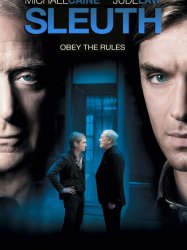
Sleuth (2007)
, 1h28Directed by Kenneth Branagh
Origin United-kingdom
Genres Drama, Thriller, Comedy-drama, Crime
Themes Films about writers, Théâtre, Films based on plays
Actors Michael Caine, Jude Law, Harold Pinter, Kenneth Branagh
Roles Man on T.V.
Rating63%





"A millionaire detective novelist matches wits with the unemployed actor who ran off with his wife in a deadly serious, seriously twisted game with dangerous consequences."
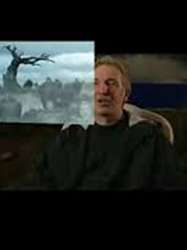 , 10h47
, 10h47Directed by Anthony Minghella, Charles Sturridge, Atom Egoyan, Damien O'Donnell, Conor McPherson
Genres Documentary
Themes Films based on plays
Actors Penelope Wilton, Alan Rickman, Harold Pinter, Julianne Moore
Rating40%






The Tailor of Panama (2001)
, 1h49Directed by John Boorman
Origin USA
Genres Drama, Thriller, Comedy, Comedy-drama
Themes Spy films
Actors Pierce Brosnan, Geoffrey Rush, Jamie Lee Curtis, Leonor Varela, Brendan Gleeson, Catherine McCormack
Roles Uncle Benny
Rating60%





Andy Osnard is an MI6 spy reassigned to Panama after having an affair in Madrid with the foreign minister’s mistress. His superior warns him of the corruption present in Panama, but Osnard views that as an opportunity. Consulting a list of British citizens residing in Panama, he meets Harry Pendel, the tailor to many of Panama's elite, including the President. Pendel, a gifted storyteller, passes himself off as being formerly of Savile Row, but is in fact an ex-con who used to run scams with his late uncle Benny. Pendel's wife Louisa, the assistant to the administrator of the Panama Canal Authority, is unaware of his criminal record. While Harry is a superb tailor, he is a bad businessman; his tailor shop is constantly in debt, and he owes $50,000 of Louisa's money to the bank for a farming business that failed.
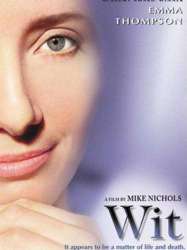
Wit (2001)
, 1h39Directed by Mike Nichols
Origin USA
Genres Drama, Comedy-drama
Themes Films about education, Medical-themed films, Films about cancer, Films based on plays
Actors Emma Thompson, Christopher Lloyd, Audra McDonald, Eileen Atkins, Benedict Wong, Jonathan M. Woodward
Roles Mr. Bearing
Rating79%





Vivian Bearing (Emma Thompson) is a professor of English literature known for her intense knowledge of metaphysical poetry, especially the Holy Sonnets of John Donne. Her life takes a turn when she is diagnosed with metastatic Stage IV ovarian cancer. Oncologist Harvey Kelekian prescribes various chemotherapy treatments to treat her disease, and as she suffers through the various side-effects (such as fever, chills, vomiting, and abdominal pain), she attempts to put everything in perspective. The story periodically flashes back to previous moments in her life, including her childhood, her graduate school studies, and her career prior to her diagnosis. During the course of the film, she continually breaks the fourth wall by looking into the camera and expressing her feelings.
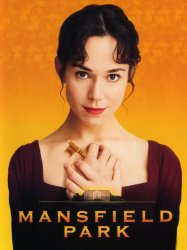
Mansfield Park (1999)
, 1h52Directed by Patricia Rozema
Origin United-kingdom
Genres Drama, Romance
Themes Feminist films, Politique, Political films
Actors Frances O'Connor, James Purefoy, Billie Piper, Jonny Lee Miller, Harold Pinter, Lindsay Duncan
Roles Sir Thomas Bertram
Rating69%





At the age of 10, Fanny Price is sent to live with her wealthy uncle and aunt, Sir Thomas and Lady Bertram, as her own parents married for love and do not have enough money to support their many children. Once at Mansfield Park, Fanny meets her cousins Tom, Maria, Edmund, and Julia, as well as Fanny's other maternal aunt, Mrs Norris. Fanny does not feel welcome, and Mrs. Norris treats her more like a servant than a relative. She becomes upset upon learning that she is expected to stay at Mansfield indefinitely. Edmund behaves kindly to her, and the two develop a friendship that grows as the years progress.

Turtle Diary (1985)
, 1h37Directed by John Irvin
Origin USA
Genres Drama, Thriller, Comedy, Romantic comedy, Horror, Romance
Actors Glenda Jackson, Ben Kingsley, Richard Johnson, Michael Gambon, Jeroen Krabbé, Rosemary Leach
Roles Man in Bookshop
Rating68%





Two lonely Londoners - Neaera Duncan, a children's author (Glenda Jackson), and William Snow, a bookstore assistant (Ben Kingsley) - find common ground when visiting the sea turtles at London Zoo; independently of each other, both perceive that the turtles are unnaturally confined, and they hatch a plan with the assistance of zookeeper George Fairbairn (Michael Gambon) to smuggle them out and release them into the sea, which they ultimately succeed in accomplishing. Their release of the turtles represents metaphorically their release of themselves from their own inhibitions.
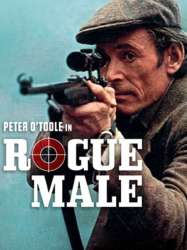
Rogue Male (1976)
, 1h43Directed by Clive Donner
Origin United-kingdom
Genres Drama, War, Thriller
Actors Peter O'Toole, John Standing, Alastair Sim, Harold Pinter, Michael Byrne, Ray Smith
Roles Saul Abrahams
Rating65%





In early 1939, before the start of World War II, Sir Robert Hunter (O'Toole) takes aim at Adolf Hitler with a high-powered rifle, but misses when he is spotted and tackled by an SS guard. Captured and tortured by the Gestapo, he is then left for dead, but manages to make his way back to England where, to his shock, he discovers the Gestapo has followed him. Believing that the government would, in all likelihood, turn him over to German authorities, Sir Robert goes underground (literally) to escape his pursuers.
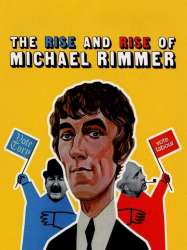 , 1h40
, 1h40Genres Drama, Comedy
Actors Peter Cook, John Cleese, Denholm Elliott, Ronald Fraser, Harold Pinter, Arthur Lowe
Roles Steven Hench
Rating68%





The mysterious Michael Rimmer (Cook) appears at a small and ailing British advertising agency, where the employees assume he is working on a time and motion study. However, he quickly begins to assert a de facto authority over the firm’s mostly ineffectual staff and soon acquires control of the business from the incompetent boss Ferret (Arthur Lowe). Rimmer then succeeds in establishing the newly invigorated firm as the country’s leading polling agency, and begins to make regular TV appearances as a polling expert. He subsequently moves into politics, acting as an adviser to the leader of the Tory opposition, and then becomes an MP himself, for the constituency of Budleigh Moor (a reference to Cook's frequent collaborator, Dudley Moore), along the way acquiring a trophy wife (Vanessa Howard). Relying on a combination of charisma and deception—and murder—he then rapidly works his way up the political ladder to become prime minister (after throwing his predecessor off an oil rig), and finally, by public demand, a near-dictatorial president. Ferret attempts to assassinate Rimmer as he and his wife ride through the capital in an open-topped convertible, but fails and falls to his death.

Accident (1967)
, 1h45Directed by Joseph Losey
Origin United-kingdom
Genres Drama, Comedy-drama, Crime, Romance
Themes Films about education
Actors Dirk Bogarde, Stanley Baker, Jacqueline Sassard, Michael York, Vivien Merchant, Delphine Seyrig
Roles Bell - TV Producer
Rating67%





The story centers on a married Oxford professor, Stephen, who is experiencing a mid-life crisis. The world changes for him when he meets Anna, a beautiful young student, who is engaged to another of his students, William. Following a car accident outside Stephen's home in which William is killed and Anna is severely disoriented, she is obliged to remain with Stephen although his wife is out of town. The events preceding the accident are told in flashbacks. While Stephen believes that he is orchestrating a tryst with Anna that will leave both his wife and William in the dark, he soon discovers that Anna is playing a game of her own.
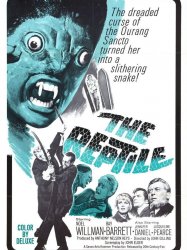
The Reptile (1966)
, 1h31Directed by John Gilling
Origin United-kingdom
Genres Fantasy, Horror
Actors Noel Willman, Jennifer Daniel, Ray Barrett, Jacqueline Pearce, Michael Ripper, John Laurie
Rating60%





Dans un village reculé des Cornouailles, plusieurs habitants meurent après d'horribles souffrances. Le médecin légiste découvre des traces de morsures de serpent sur les corps. Un couple de nouveaux résidents après plusieurs incidents vont tenter de découvrir la vérité.

The Caretaker (1964)
, 1h45Directed by Clive Donner
Origin United-kingdom
Genres Drama
Themes Théâtre, Films based on plays
Actors Alan Bates, Donald Pleasence, Robert Shaw, Harold Pinter
Roles Man
Rating70%





Aston invite Davies chez lui (une pièce unique encombrée d'un bric-à-brac) après l'avoir tiré d'une dispute dans un café. Davies finit par accepter l'offre d'Aston de l'héberger temporairement, n'ayant ni argent, ni domicile, ni papiers. Il se révèle vite être un vieil homme opportuniste, parasitique et peu amène, se plaignant de tout et volontiers raciste. Mick, propriétaire de la maison dans laquelle vit son frère Aston, semble irrité par l'intrusion de Davies et le rudoie. Aston propose à Davies d'être gardien de l'immeuble mais sa patience finit par s'user devant l'égoïsme du vieil homme. Davies tente alors d'obtenir l'appui de Mick contre son frère, mais la manœuvre échoue. À la fin de la pièce Davies en appelle à nouveau à Aston mais il est clair que ce sera en vain.

The Servant (1963)
, 1h56Directed by Joseph Losey
Origin United-kingdom
Genres Drama, Comedy-drama, Romance
Themes Films about the labor movement
Actors Dirk Bogarde, Sarah Miles, James Fox, Wendy Craig, Catherine Lacey, Patrick Magee
Roles People in Restaurant: Society Man
Rating77%





Tony (James Fox), a wealthy young Londoner, hires Hugo Barrett (Dirk Bogarde) as his manservant. Initially, Barrett appears to take easily to his new job, and he and Tony form a quiet bond, retaining their social roles. Relationships begin shifting, however, and they change with the introduction of Susan (Wendy Craig), Tony's girlfriend, who seems to be suspicious of Barrett and to loathe all he represents. Barrett brings Vera (Sarah Miles), whom he presents as his sister, into Tony's household as a maidservant, but it emerges that Vera is actually Barrett's lover. Through Barrett's and Vera's games and machinations, they reverse roles with Tony and Susan; Tony becomes more and more dissipated, sinking further into what he perceives as their level, as the "master" and the "servant" exchange roles. In the final scene, Tony has become wholly dependent on Barrett, and Susan is exiled permanently from the house.
Director
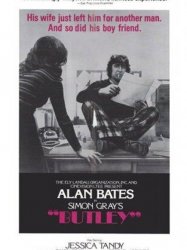
Butley (1974)
Directed by Harold Pinter
Genres Drama
Themes Films about education, Films about sexuality, Bisexuality-related films, LGBT-related films, Films based on plays, LGBT-related films, LGBT-related film
Actors Alan Bates, Jessica Tandy, Michael Byrne, Georgina Hale, Richard O'Callaghan, Susan Engel
Rating66%





Une journée dans la vie d'un professeur d'université en pleine crise existentielle.
Scriptwriter

Sleuth (2007)
, 1h28Directed by Kenneth Branagh
Origin United-kingdom
Genres Drama, Thriller, Comedy-drama, Crime
Themes Films about writers, Théâtre, Films based on plays
Actors Michael Caine, Jude Law, Harold Pinter, Kenneth Branagh
Rating63%





"A millionaire detective novelist matches wits with the unemployed actor who ran off with his wife in a deadly serious, seriously twisted game with dangerous consequences."
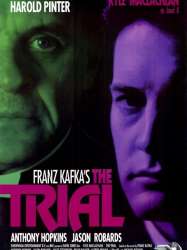
The Trial (1993)
, 2hDirected by David Hugh Jones
Origin United-kingdom
Genres Drama, Thriller
Actors Kyle MacLachlan, Anthony Hopkins, Jason Robards, Juliet Stevenson, Alfred Molina, David Thewlis
Rating59%





 Connection
Connection
